Unit 2 Sporting events Grammar and usage(1)_ Modal verbs课件(61张)
文档属性
| 名称 | Unit 2 Sporting events Grammar and usage(1)_ Modal verbs课件(61张) | 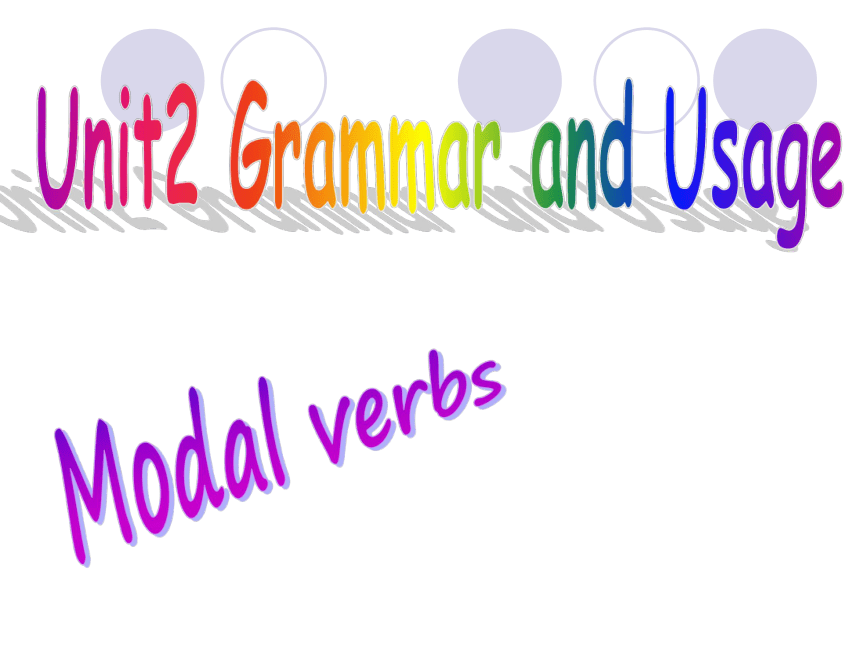 | |
| 格式 | zip | ||
| 文件大小 | 446.1KB | ||
| 资源类型 | 教案 | ||
| 版本资源 | 牛津译林版 | ||
| 科目 | 英语 | ||
| 更新时间 | 2019-07-25 22:37:10 | ||
图片预览

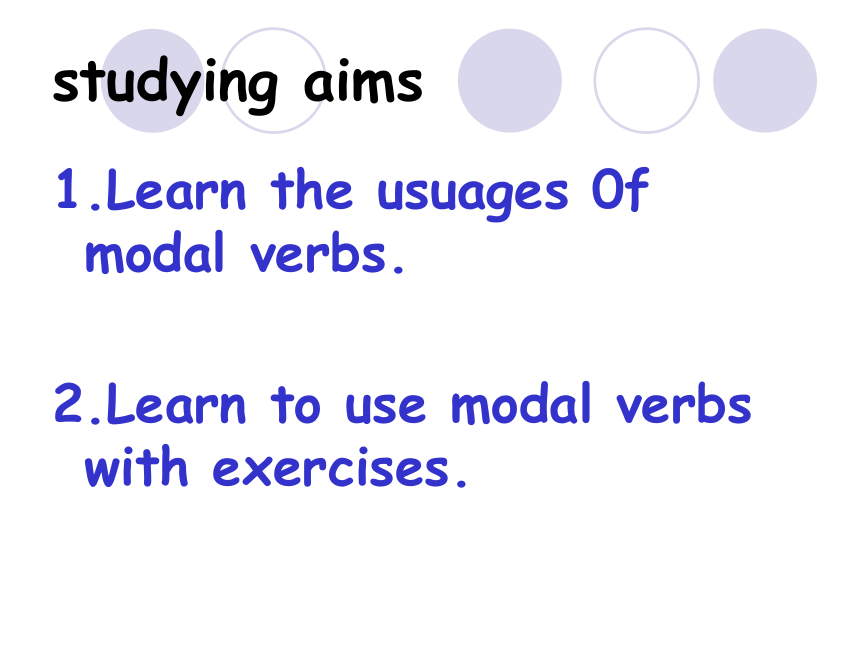


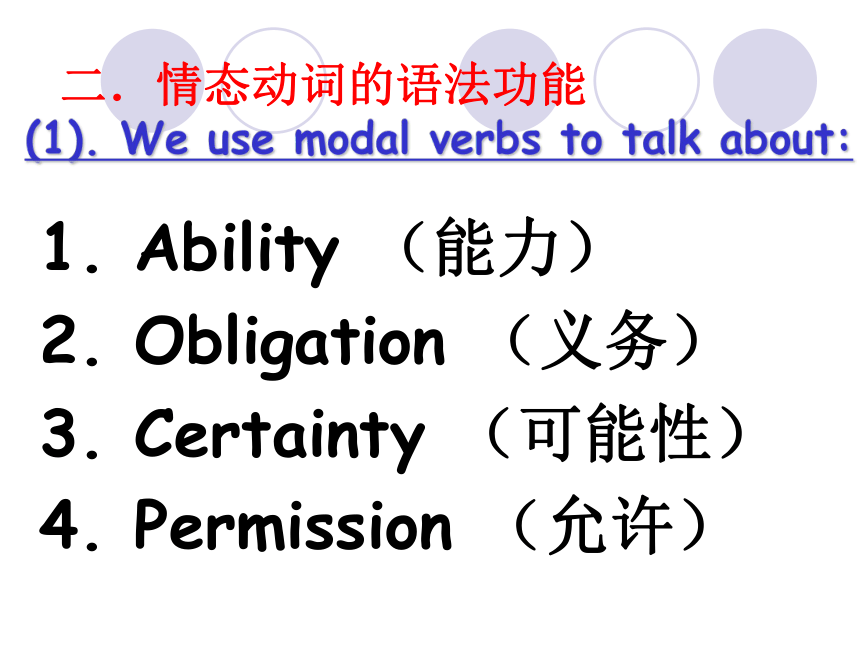
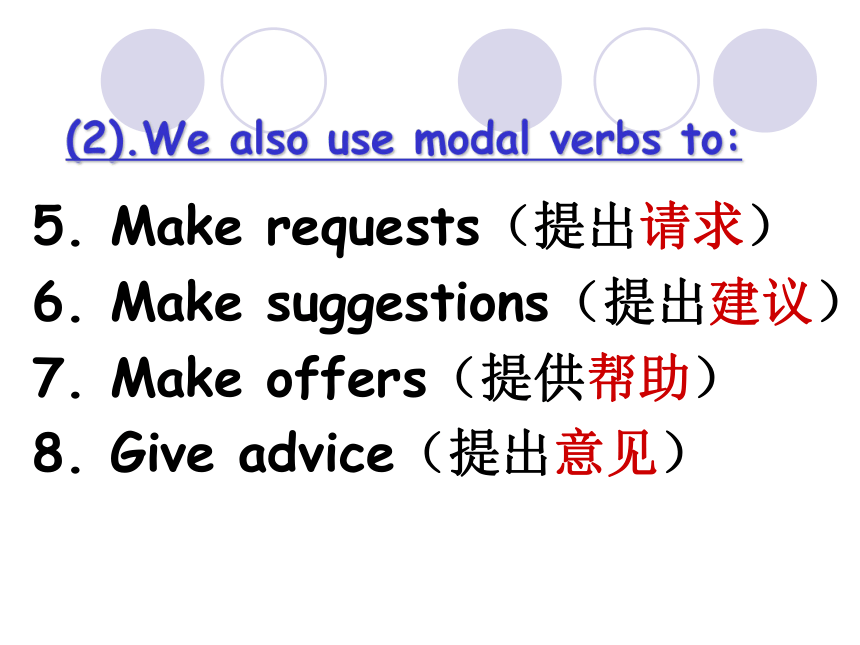
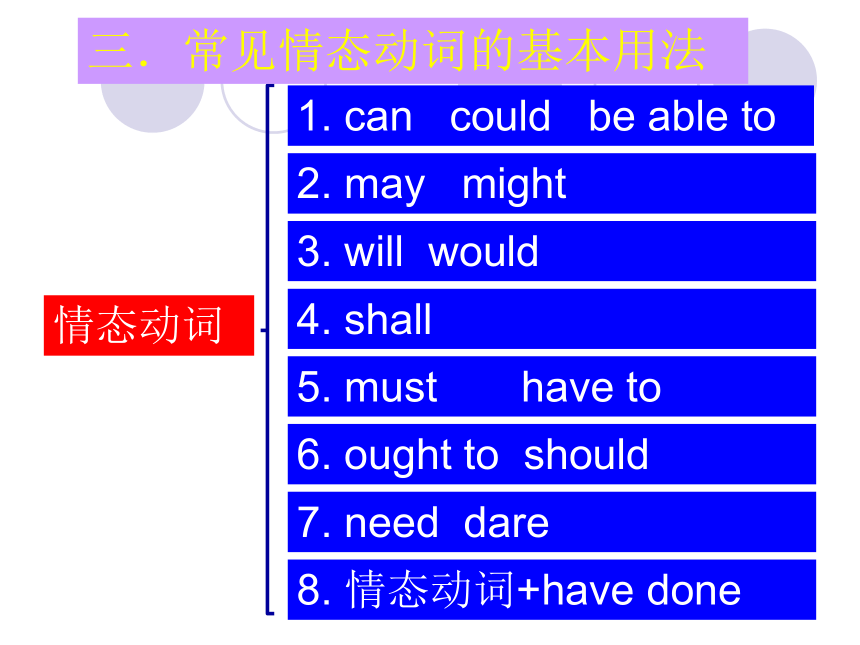
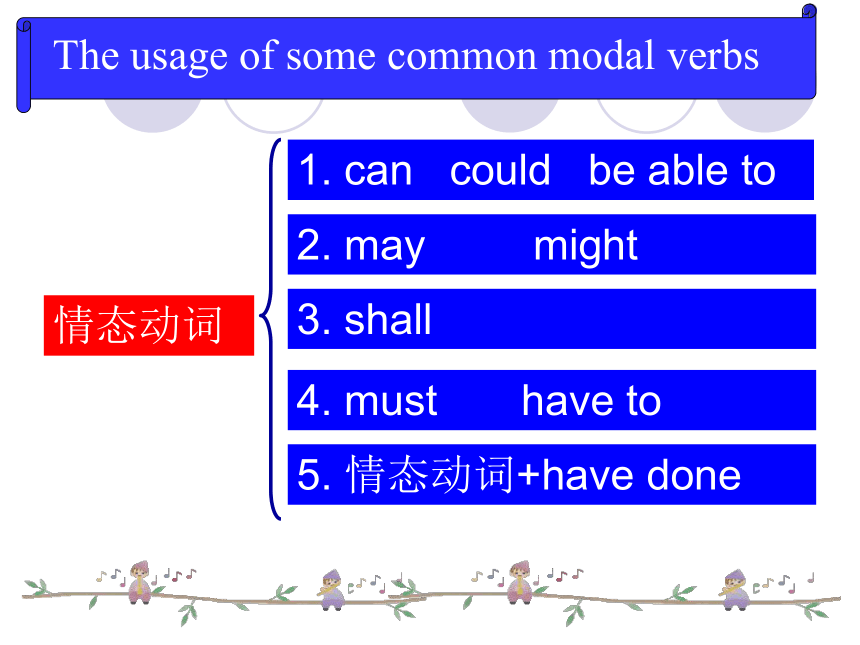
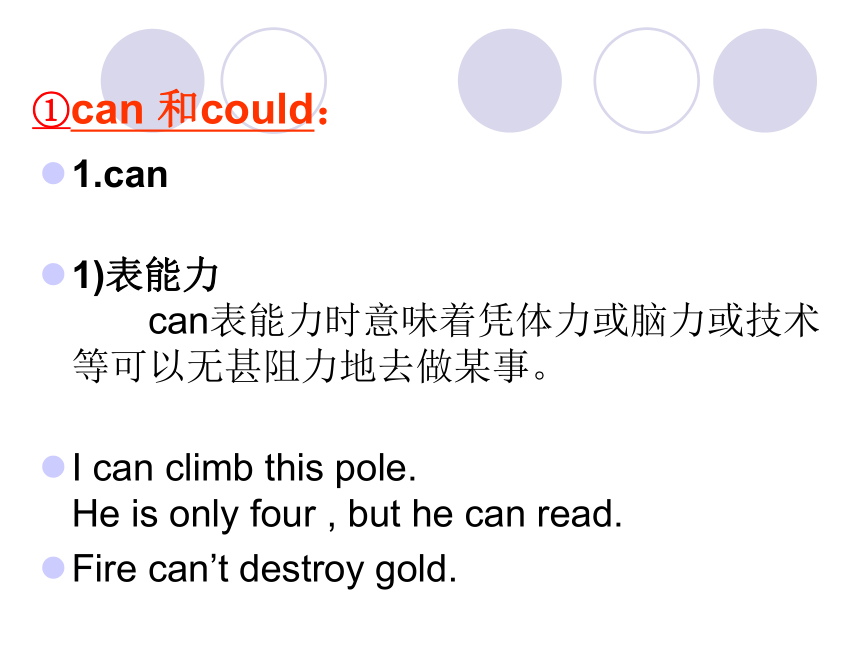
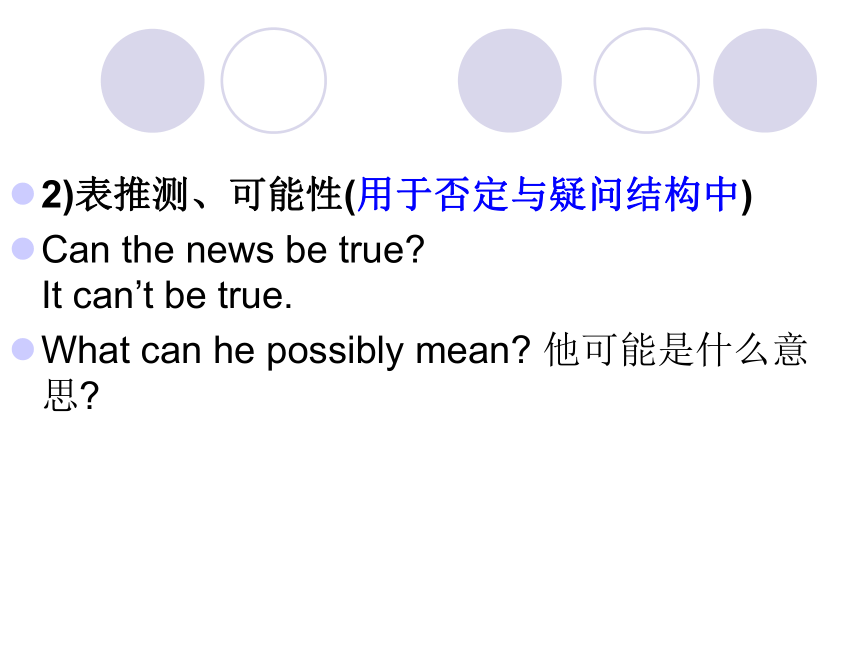
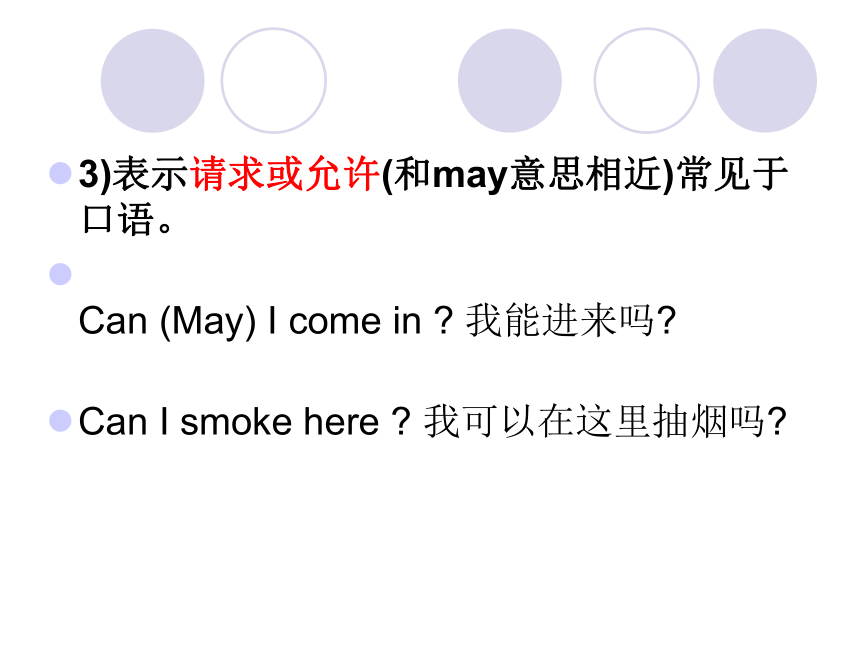

文档简介
课件61张PPT。Unit2 Grammar and UsageModal verbsstudying aims1.Learn the usuages 0f modal verbs.
2.Learn to use modal verbs with exercises.
What’s the definition of modal verbs?情态动词是一种本身有一定的词义,表示说话人的情绪,态度或语气的动词,但不能单独作谓语, 只能和其他动词原形构成谓语。 一.情态动词的语法特征1)?情态动词?不能单独做谓语,除ought ?和have?外,后面只能接不带to?的不定式。 2)?情态动词没有人称,数的变化,但有些情态动词,如can、will也有一般式和过去式的变化。3)?情态动词的“时态”形式并不是时间区别的主要标志,不少情况下,情态动词的现在式形式和过去式形式都可用来表示现在时间、过去时间和将来时间。(1). We use modal verbs to talk about:1. Ability (能力)
2. Obligation (义务)
3. Certainty (可能性)
4. Permission (允许)二.情态动词的语法功能(2).We also use modal verbs to:5. Make requests(提出请求)
6. Make suggestions(提出建议)
7. Make offers(提供帮助)
8. Give advice(提出意见) 情态动词1. can could be able to4. shall 2. may might三.常见情态动词的基本用法5. must have to 3. will would7. need dare6. ought to should8. 情态动词+have done 情态动词1. can could be able to3. shall 2. may mightThe usage of some common modal verbs4. must have to 5. 情态动词+have done1.can
1)表能力 can表能力时意味着凭体力或脑力或技术等可以无甚阻力地去做某事。
I can climb this pole. He is only four , but he can read.
Fire can’t destroy gold. ①can 和could:2)表推测、可能性(用于否定与疑问结构中)
Can the news be true? It can’t be true.
What can he possibly mean? 他可能是什么意思?
3)表示请求或允许(和may意思相近)常见于口语。
Can (May) I come in ? 我能进来吗?
Can I smoke here ? 我可以在这里抽烟吗? 2) could的主要用法是:
A. could 是can的过去式, 表示与过去 有关的能力和推测:
eg. We all knew that the young man
couldn’t be a doctor.
B. could可以代替can表示请求、允许。可表示委婉客气的提出问题或陈述看法Could you lend me your dictionary?
Could I use your bike?
Yes, you can.
I’m afraid I couldn’t give you an answer today. Attention:can/be able to区别:can表示与生俱来的能力或一种客观可能,而be able to更加强调通过后天的学习和努力获得的能力,或者在某个客观的场合和背景下,能做到的事情。I can’t swim, but I am sure I will be able to
swim through more practicing.表示特定的某一过去能力或表示成功地做了某事时,只能用was/were?able?to,?不能用could。 He?_________?flee?Europe?before?the?war?broke?out. ??
Note:was able toA big fire broke out in ABC hotel yesterday. Luckily, everyone __________ run out of the building.was able to2. She _____ speak both English and French.canI can’t thank you too much.can never/can’t……too表示“无论怎样…也不过分”,“越…越好” 。你过马路的时候再小心也不为过。 You can’t be too careful while crossing the road. She couldn’t but agree to my idea.
I can’t thank you enough.
The film couldn’t be any worse.Can或could 的否定形式构成习惯短语
Can’t...too...
Can’t ....enough...无论怎样……也不过分……
Can’t (help) but do不得不做,只好做
Can’t help doing 情不自禁
Can’t help it 没有办法
Can’t ...+比较级 再……不过了(表示最高级)May I watch TV after supper?
Yes,__________________./ No, _______________________.
Might I use your telephone?
May I go home now?
It may be true.
She may come tomorrow.
He might have some fever.
May you succeed!
May you have many more days as happy as this one!you mayYou mustn’t允许,许可禁止,阻止Might比May的语气更委婉表示可能性的推测,译为“大概,可能”用might时显得更加不肯定用于祈使句表示祝愿②. May 和MightA computer _______ think for itself; it must be told what to do.
A. can’t B. couldn’t
C. may not D. might notAmay ______________ can____________表主观“可能”表客观“可能”cannot___________ may not__________不可能可能不 may 和can—They___ be doing the experiment in the lab.
—Why?
—Because the lights are still burning.A.could B.can
C.must D.would ③will和would: will当作情态动词时有以下用法:If you give him time, Tom will talk and talk for hours.
Every Saturday evening they will play chess together表经常性,习惯性“老是、总是、终归是”
The door won’t open.
I’ll do my best to help you.
Will you please give me a message when you see him?
---Write to me when you get home.
---I will.表示功能,译作“能”或“行”意愿2人称,询问对方意愿或向对方提出请求回答祈使句Would当作情态动词时有以下用法:
Would you help us, please?
When I had some trouble, he would encourage me.
We all tried to stop him smoking in bed but he wouldn’t listen.过去的习惯意愿“要;愿”用于2人称,表示有礼貌的请求或邀请Would 与 Used to do 区别 ——— “过去常常” Would
------过去习惯的动作(现在有可能还有此习惯)
Used to do
--------过去习惯的动作及状态(现在已经没有此习惯) The old man _______have a smoke under a big tree every afternoon after he finished his farm work. would可表示经常性、习惯性、倾向性。翻译为“经常、惯于、总是”。
④shall和should: 1. shall用于征求对方的意见,表 “决心”
Shall we go by train, Mom?
妈妈,我们乘火车去好吗?
(用于征求对方的意见)
I shall go at once.
我必须立即去。
(表 “决心”) 1)用于第一、 三人称征求对方的意见,
What shall he wear on the journey?
Shall we dance?
2)shall 用于第二、三人称时表允诺,警告,命令,威胁。“必须,应该可以”
If he passes the examination, he shall have a holiday.
You shall have it back tomorrow.3)用于第二、三人称用于法律法规条例等文件中的要求。“应该、必须”
It’s required in our regulation that students shall go to school on time.
Persons under 18 shan’t be employed in night work.
2. should表示义务、建议、劝告等,意为 “应该”。(ought to)
Students should respect teachers.
The boys shouldn’t be playing football; they should be at school.
It’s 4:30,They should be in New York by now.劝告、建议义务、责任常规、常理的推测(正常情况下)按理应该He ought to succeed, as he is so diligent.
It is strange that it should be so hot today.
I don’t understand why she should have made such a mistake.
Should it rain tomorrow, the meeting will be postponed.
居然,竟然与疑问词连用,表示意外、纳闷、惊讶等
“究竟是,到底”用于条件句中“万一”
--- What’s the name?
--- Khulaifi. _______ I spell that for you?
Shall B. Would
C. Can D. Might Drill(小练)(10江苏)
—I haven’t got the reference book yet, but I’ll have a test on the subject next month.
—Don’t worry. You______ have it by Friday.
A. could B. shall C. must D.may 解析:shall在第二人称中表示允诺,还可以表示强制,命令,威胁,警告。还有在法律条文中的要求或规定。答案:BYou shall be punished for what you've done.你一定会因为你的所作所受到惩罚。⑤must和 have?to1.must用于一般问句中,肯定回答用must否定式用?needn’t或don’t have to,做?“不必”, mustn’t表示“禁止,不允许” ?— Must?I?finish?all?the work?at?a?time? ??—Yes, you must.
No,?you?needn't. I don’t like this TV set. We must buy a new one. There was no more bus. They had to walk home.2.表示“必须”这个意思时,must?和have?to?稍有区别。must着重说明主观看法,have?to?强调客观需要。另外,have?to?能用于更多时态。 ?You?must?be?the?new?teacher. ?
He?must?be?joking. There?is?nobody?here.?They?must?have?all gone?home. 3.must表示对某人某事的猜测,?作“准是”,“一定” ,一般用于肯定句中。对过去发生的事情作肯定判断用must have done
—How old are you, madam?
—If you must know, I'm twice my son's age.
4. must表示“偏要,硬要”,指做令人不快的事情need 与 dare 实义动词情态动词⑥.可兼做行为动词的情态动词:need 、 dare 情态动词 (+动词原形)行为动词 .needdare 1.无人称和数的变化; 2.尤其用于:*否定句及疑问句中;*在if/whether之后;*或与hardly, never,
no one, nobody连用; 3.常以needn’t 和daren’t
的形式出现;4.dare有其过去时dared. 多用于肯定句;
need to do
dare to do
need to be done
need doing
实义动词 vs 情态动词肯定句 实情e.g. She needs to stay at home today.
e.g. He dares to jump from the high wall.
e.g. She need stay at home today.
e.g. He dare jump from the high wall.疑问句
e.g. Does she need to stay at home today?
e.g. Does he dare to jump from the high wall?e.g. Need she stay at home today?
e.g. Dare he jump from the high wall?实情否定句Dare 作为实意动词的时候,否定句中的 to 可以省略e.g.He doesn’t dare (to) jump from the high wall.实e.g. She doesn’t need to stay at home today.
e.g. He doesn’t dare to jump from the high wall情e.g. She needn’t stay at home today.
e.g. He dare not jump from the high wall. 表示否定的情态动词的用法:
部分情态动词的否定式是情态动词中的考点
之一。
mustn’t 不准, 禁止
needn’t 没必要 ( = don’t have to )
can’t 不能; 不可能
may not 不可以; 可能不
shouldn’t 不应该 ( = ought not to )Attention:
must have done
过去一定做过某事
can’t have done
过去不可能做过某事
should ( ought to ) have done
过去本该做某事却没做
shouldn’t ( ought not to ) have done
过去本不该做某事却做了⑦. 情态动词+have done表示对已经发生事情推测、
责怪、后悔、遗憾等。
needn’t have done
过去没有必要做某事而实际上却做了
could have done
过去本可以做某事却没做
might have done
过去可能已经做了某事5. 情态动词+have done表示对已经发生事情推测、
责怪、后悔、遗憾等。1. It must have rained last night, for the streets are wet.
2. He looks very happy. He might not have known the result.
3. He could not have done such a thing.
4. She didn’t come to school yesterday. Can she have been ill?
5. They left here early and should have arrived by now.情态动词表推测 对过去情况的推测6. You might have written the letter without my reminding you of it.
7. The doctor could have avoided the accident
8. You should have finished the task yesterday.
9.I was really anxious about you,you shouldn’t have left home without a word.
10.He ought not to have told me your secret,but he meant no harm.过去本可能(不用may) 过去本能够…却没有过去本应该…却没有过去本不该…过去本不该…1. The weather turned out to be fine yesterday. I___ the trouble to carry my umbrella with me.
A. should have taken B. could have taken
C. needn’t have taken D. mustn’t have taken
2. ---I’ll tell Mary about her new job tomorrow.
---You __________her last week.
A. ought to tell B. would have told
C. must tell D. should have told CDPractice3. She _______ have left school, for her bike is still here.
A. can’t B. wouldn’t C. shouldn’t D. needn’t
4. --- I can’t find my purse anywhere.
--- You ______ have lost it while shopping.
A. may B. can C. should D. would
5. --- I stayed at a hotel while in New York.
--- Oh, did you? You ______with Barbara.
A. could have stayed B. could stay
C. would stay D. must have stayed AAA表推测的情态动词句子的反意疑问句 He must/may be in the room, isn’t he? He can’t be in the room, is he?
He must have finished the work, hasn’t he? He may have done the work last night, didn’t he?
He must have been caught in the heavy rain last night,____________ wasn’t he.
1. — _____ I take the book out?
—I'm afraid not.
A. Will B. May C. Must D. Need考点:考查情态动词。
解析:表请求可用情态动词can, may, could, might ,表允许用can, may.
句意为:“我可以将这本书带出去吗?”“恐怕不行”。故应选表请求的情态动词may。正确答案为B。答案:B
2. ----May I take this book out of the reading room?
----No, you . You read it in here.
A. mightn’t B. won’t
C. needn’t D. mustn’t解析:考查情态动词。英语中用could,might表示询问或征求意见的问句中,肯定性应答要用can或may来代替could或might,而may或might征求意见的问句否定应答时要用mustn’t,表示禁止.故本题选D。答案:D
3. You_____buy a gift, but you can if you want to.
A. must B. mustn't
C. have to D. don't have to 考点:情态动词
解析:don’t have to 意为“没有必要”,符合语境,句意为:“你没有必要买礼物,但如果你想买的话,你也可以买。”答案:D
4. “You ____ have a wrong number,” she said. “There’s no one of that name here.”
A. need B. can
C. must D. would 考点:情态动词
解析:肯定猜测,用must答案:C(10全国Ⅱ)
5.I’m afraid Mr. Harding _________see you now. He’s busy.
A. can’t B. mustn’t
C. shouldn’t D .needn’t解析:情态动词考查。结合语境,根据情态动词用于疑问或否定推测时,要用can’t。答案:A6. I can’t thank you too much for your kindness, because without your help I______have won the first prize in the speech contest.
A.can’t B.shouldn’t
C.might not D.couldn’t
考查情态动词的虚拟语气的用法。意为,我再感谢你也不为过,没有你的帮助,我不可能在演讲比赛中获得第一名。根据句意可知,演讲比赛已经结束。Can't have done 不可能做了某事。 Shouldn't have done 本不应当做某事 might not have done 可能没有干某事,均不符合题意。D7 –What sort of house do you want to have?
Something big?
--Well, it ________ be big—that’s not important.
A. mustn’t B. needn’t C. can’t D. won’t
改错
Mr. Li mustn’t have gone to Shanghai
because I saw him a few minutes ago.B can’tmust表推测只用于肯定句, 否定句中表推测
用can’t;
mustn’t 指 “禁止、不准”8. ---Where is my dictionary? I remember
I put it here yesterday.
---You ____it in the wrong place.
A. must put B. should have put
C. might put D. might have put
9. ---Is John coming by train?
---He should, but he _____not. He likes
driving his car.
A. must B. can C. need D. may
DD表对过去可能性的推测。
10. A __________ candle _________ the faces of everybody in the room. They all looked tired.
A. lit , lit up??? B. lit up , lit???
C. lighted, lit up?? D. lighted, lit
11.There is a party tonight _____ our new president, and I am ______ to be invited.
A. in honor; honored
B. in place of; of great honor
C. in great honor; in favor of
D. in honor of; honoredDC
2.Learn to use modal verbs with exercises.
What’s the definition of modal verbs?情态动词是一种本身有一定的词义,表示说话人的情绪,态度或语气的动词,但不能单独作谓语, 只能和其他动词原形构成谓语。 一.情态动词的语法特征1)?情态动词?不能单独做谓语,除ought ?和have?外,后面只能接不带to?的不定式。 2)?情态动词没有人称,数的变化,但有些情态动词,如can、will也有一般式和过去式的变化。3)?情态动词的“时态”形式并不是时间区别的主要标志,不少情况下,情态动词的现在式形式和过去式形式都可用来表示现在时间、过去时间和将来时间。(1). We use modal verbs to talk about:1. Ability (能力)
2. Obligation (义务)
3. Certainty (可能性)
4. Permission (允许)二.情态动词的语法功能(2).We also use modal verbs to:5. Make requests(提出请求)
6. Make suggestions(提出建议)
7. Make offers(提供帮助)
8. Give advice(提出意见) 情态动词1. can could be able to4. shall 2. may might三.常见情态动词的基本用法5. must have to 3. will would7. need dare6. ought to should8. 情态动词+have done 情态动词1. can could be able to3. shall 2. may mightThe usage of some common modal verbs4. must have to 5. 情态动词+have done1.can
1)表能力 can表能力时意味着凭体力或脑力或技术等可以无甚阻力地去做某事。
I can climb this pole. He is only four , but he can read.
Fire can’t destroy gold. ①can 和could:2)表推测、可能性(用于否定与疑问结构中)
Can the news be true? It can’t be true.
What can he possibly mean? 他可能是什么意思?
3)表示请求或允许(和may意思相近)常见于口语。
Can (May) I come in ? 我能进来吗?
Can I smoke here ? 我可以在这里抽烟吗? 2) could的主要用法是:
A. could 是can的过去式, 表示与过去 有关的能力和推测:
eg. We all knew that the young man
couldn’t be a doctor.
B. could可以代替can表示请求、允许。可表示委婉客气的提出问题或陈述看法Could you lend me your dictionary?
Could I use your bike?
Yes, you can.
I’m afraid I couldn’t give you an answer today. Attention:can/be able to区别:can表示与生俱来的能力或一种客观可能,而be able to更加强调通过后天的学习和努力获得的能力,或者在某个客观的场合和背景下,能做到的事情。I can’t swim, but I am sure I will be able to
swim through more practicing.表示特定的某一过去能力或表示成功地做了某事时,只能用was/were?able?to,?不能用could。 He?_________?flee?Europe?before?the?war?broke?out. ??
Note:was able toA big fire broke out in ABC hotel yesterday. Luckily, everyone __________ run out of the building.was able to2. She _____ speak both English and French.canI can’t thank you too much.can never/can’t……too表示“无论怎样…也不过分”,“越…越好” 。你过马路的时候再小心也不为过。 You can’t be too careful while crossing the road. She couldn’t but agree to my idea.
I can’t thank you enough.
The film couldn’t be any worse.Can或could 的否定形式构成习惯短语
Can’t...too...
Can’t ....enough...无论怎样……也不过分……
Can’t (help) but do不得不做,只好做
Can’t help doing 情不自禁
Can’t help it 没有办法
Can’t ...+比较级 再……不过了(表示最高级)May I watch TV after supper?
Yes,__________________./ No, _______________________.
Might I use your telephone?
May I go home now?
It may be true.
She may come tomorrow.
He might have some fever.
May you succeed!
May you have many more days as happy as this one!you mayYou mustn’t允许,许可禁止,阻止Might比May的语气更委婉表示可能性的推测,译为“大概,可能”用might时显得更加不肯定用于祈使句表示祝愿②. May 和MightA computer _______ think for itself; it must be told what to do.
A. can’t B. couldn’t
C. may not D. might notAmay ______________ can____________表主观“可能”表客观“可能”cannot___________ may not__________不可能可能不 may 和can—They___ be doing the experiment in the lab.
—Why?
—Because the lights are still burning.A.could B.can
C.must D.would ③will和would: will当作情态动词时有以下用法:If you give him time, Tom will talk and talk for hours.
Every Saturday evening they will play chess together表经常性,习惯性“老是、总是、终归是”
The door won’t open.
I’ll do my best to help you.
Will you please give me a message when you see him?
---Write to me when you get home.
---I will.表示功能,译作“能”或“行”意愿2人称,询问对方意愿或向对方提出请求回答祈使句Would当作情态动词时有以下用法:
Would you help us, please?
When I had some trouble, he would encourage me.
We all tried to stop him smoking in bed but he wouldn’t listen.过去的习惯意愿“要;愿”用于2人称,表示有礼貌的请求或邀请Would 与 Used to do 区别 ——— “过去常常” Would
------过去习惯的动作(现在有可能还有此习惯)
Used to do
--------过去习惯的动作及状态(现在已经没有此习惯) The old man _______have a smoke under a big tree every afternoon after he finished his farm work. would可表示经常性、习惯性、倾向性。翻译为“经常、惯于、总是”。
④shall和should: 1. shall用于征求对方的意见,表 “决心”
Shall we go by train, Mom?
妈妈,我们乘火车去好吗?
(用于征求对方的意见)
I shall go at once.
我必须立即去。
(表 “决心”) 1)用于第一、 三人称征求对方的意见,
What shall he wear on the journey?
Shall we dance?
2)shall 用于第二、三人称时表允诺,警告,命令,威胁。“必须,应该可以”
If he passes the examination, he shall have a holiday.
You shall have it back tomorrow.3)用于第二、三人称用于法律法规条例等文件中的要求。“应该、必须”
It’s required in our regulation that students shall go to school on time.
Persons under 18 shan’t be employed in night work.
2. should表示义务、建议、劝告等,意为 “应该”。(ought to)
Students should respect teachers.
The boys shouldn’t be playing football; they should be at school.
It’s 4:30,They should be in New York by now.劝告、建议义务、责任常规、常理的推测(正常情况下)按理应该He ought to succeed, as he is so diligent.
It is strange that it should be so hot today.
I don’t understand why she should have made such a mistake.
Should it rain tomorrow, the meeting will be postponed.
居然,竟然与疑问词连用,表示意外、纳闷、惊讶等
“究竟是,到底”用于条件句中“万一”
--- What’s the name?
--- Khulaifi. _______ I spell that for you?
Shall B. Would
C. Can D. Might Drill(小练)(10江苏)
—I haven’t got the reference book yet, but I’ll have a test on the subject next month.
—Don’t worry. You______ have it by Friday.
A. could B. shall C. must D.may 解析:shall在第二人称中表示允诺,还可以表示强制,命令,威胁,警告。还有在法律条文中的要求或规定。答案:BYou shall be punished for what you've done.你一定会因为你的所作所受到惩罚。⑤must和 have?to1.must用于一般问句中,肯定回答用must否定式用?needn’t或don’t have to,做?“不必”, mustn’t表示“禁止,不允许” ?— Must?I?finish?all?the work?at?a?time? ??—Yes, you must.
No,?you?needn't. I don’t like this TV set. We must buy a new one. There was no more bus. They had to walk home.2.表示“必须”这个意思时,must?和have?to?稍有区别。must着重说明主观看法,have?to?强调客观需要。另外,have?to?能用于更多时态。 ?You?must?be?the?new?teacher. ?
He?must?be?joking. There?is?nobody?here.?They?must?have?all gone?home. 3.must表示对某人某事的猜测,?作“准是”,“一定” ,一般用于肯定句中。对过去发生的事情作肯定判断用must have done
—How old are you, madam?
—If you must know, I'm twice my son's age.
4. must表示“偏要,硬要”,指做令人不快的事情need 与 dare 实义动词情态动词⑥.可兼做行为动词的情态动词:need 、 dare 情态动词 (+动词原形)行为动词 .needdare 1.无人称和数的变化; 2.尤其用于:*否定句及疑问句中;*在if/whether之后;*或与hardly, never,
no one, nobody连用; 3.常以needn’t 和daren’t
的形式出现;4.dare有其过去时dared. 多用于肯定句;
need to do
dare to do
need to be done
need doing
实义动词 vs 情态动词肯定句 实情e.g. She needs to stay at home today.
e.g. He dares to jump from the high wall.
e.g. She need stay at home today.
e.g. He dare jump from the high wall.疑问句
e.g. Does she need to stay at home today?
e.g. Does he dare to jump from the high wall?e.g. Need she stay at home today?
e.g. Dare he jump from the high wall?实情否定句Dare 作为实意动词的时候,否定句中的 to 可以省略e.g.He doesn’t dare (to) jump from the high wall.实e.g. She doesn’t need to stay at home today.
e.g. He doesn’t dare to jump from the high wall情e.g. She needn’t stay at home today.
e.g. He dare not jump from the high wall. 表示否定的情态动词的用法:
部分情态动词的否定式是情态动词中的考点
之一。
mustn’t 不准, 禁止
needn’t 没必要 ( = don’t have to )
can’t 不能; 不可能
may not 不可以; 可能不
shouldn’t 不应该 ( = ought not to )Attention:
must have done
过去一定做过某事
can’t have done
过去不可能做过某事
should ( ought to ) have done
过去本该做某事却没做
shouldn’t ( ought not to ) have done
过去本不该做某事却做了⑦. 情态动词+have done表示对已经发生事情推测、
责怪、后悔、遗憾等。
needn’t have done
过去没有必要做某事而实际上却做了
could have done
过去本可以做某事却没做
might have done
过去可能已经做了某事5. 情态动词+have done表示对已经发生事情推测、
责怪、后悔、遗憾等。1. It must have rained last night, for the streets are wet.
2. He looks very happy. He might not have known the result.
3. He could not have done such a thing.
4. She didn’t come to school yesterday. Can she have been ill?
5. They left here early and should have arrived by now.情态动词表推测 对过去情况的推测6. You might have written the letter without my reminding you of it.
7. The doctor could have avoided the accident
8. You should have finished the task yesterday.
9.I was really anxious about you,you shouldn’t have left home without a word.
10.He ought not to have told me your secret,but he meant no harm.过去本可能(不用may) 过去本能够…却没有过去本应该…却没有过去本不该…过去本不该…1. The weather turned out to be fine yesterday. I___ the trouble to carry my umbrella with me.
A. should have taken B. could have taken
C. needn’t have taken D. mustn’t have taken
2. ---I’ll tell Mary about her new job tomorrow.
---You __________her last week.
A. ought to tell B. would have told
C. must tell D. should have told CDPractice3. She _______ have left school, for her bike is still here.
A. can’t B. wouldn’t C. shouldn’t D. needn’t
4. --- I can’t find my purse anywhere.
--- You ______ have lost it while shopping.
A. may B. can C. should D. would
5. --- I stayed at a hotel while in New York.
--- Oh, did you? You ______with Barbara.
A. could have stayed B. could stay
C. would stay D. must have stayed AAA表推测的情态动词句子的反意疑问句 He must/may be in the room, isn’t he? He can’t be in the room, is he?
He must have finished the work, hasn’t he? He may have done the work last night, didn’t he?
He must have been caught in the heavy rain last night,____________ wasn’t he.
1. — _____ I take the book out?
—I'm afraid not.
A. Will B. May C. Must D. Need考点:考查情态动词。
解析:表请求可用情态动词can, may, could, might ,表允许用can, may.
句意为:“我可以将这本书带出去吗?”“恐怕不行”。故应选表请求的情态动词may。正确答案为B。答案:B
2. ----May I take this book out of the reading room?
----No, you . You read it in here.
A. mightn’t B. won’t
C. needn’t D. mustn’t解析:考查情态动词。英语中用could,might表示询问或征求意见的问句中,肯定性应答要用can或may来代替could或might,而may或might征求意见的问句否定应答时要用mustn’t,表示禁止.故本题选D。答案:D
3. You_____buy a gift, but you can if you want to.
A. must B. mustn't
C. have to D. don't have to 考点:情态动词
解析:don’t have to 意为“没有必要”,符合语境,句意为:“你没有必要买礼物,但如果你想买的话,你也可以买。”答案:D
4. “You ____ have a wrong number,” she said. “There’s no one of that name here.”
A. need B. can
C. must D. would 考点:情态动词
解析:肯定猜测,用must答案:C(10全国Ⅱ)
5.I’m afraid Mr. Harding _________see you now. He’s busy.
A. can’t B. mustn’t
C. shouldn’t D .needn’t解析:情态动词考查。结合语境,根据情态动词用于疑问或否定推测时,要用can’t。答案:A6. I can’t thank you too much for your kindness, because without your help I______have won the first prize in the speech contest.
A.can’t B.shouldn’t
C.might not D.couldn’t
考查情态动词的虚拟语气的用法。意为,我再感谢你也不为过,没有你的帮助,我不可能在演讲比赛中获得第一名。根据句意可知,演讲比赛已经结束。Can't have done 不可能做了某事。 Shouldn't have done 本不应当做某事 might not have done 可能没有干某事,均不符合题意。D7 –What sort of house do you want to have?
Something big?
--Well, it ________ be big—that’s not important.
A. mustn’t B. needn’t C. can’t D. won’t
改错
Mr. Li mustn’t have gone to Shanghai
because I saw him a few minutes ago.B can’tmust表推测只用于肯定句, 否定句中表推测
用can’t;
mustn’t 指 “禁止、不准”8. ---Where is my dictionary? I remember
I put it here yesterday.
---You ____it in the wrong place.
A. must put B. should have put
C. might put D. might have put
9. ---Is John coming by train?
---He should, but he _____not. He likes
driving his car.
A. must B. can C. need D. may
DD表对过去可能性的推测。
10. A __________ candle _________ the faces of everybody in the room. They all looked tired.
A. lit , lit up??? B. lit up , lit???
C. lighted, lit up?? D. lighted, lit
11.There is a party tonight _____ our new president, and I am ______ to be invited.
A. in honor; honored
B. in place of; of great honor
C. in great honor; in favor of
D. in honor of; honoredDC
